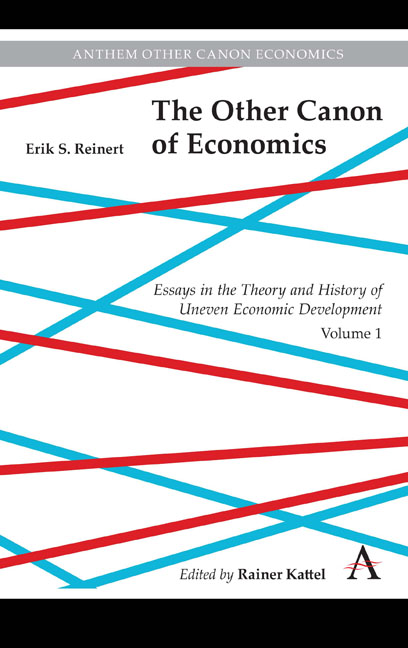Book contents
- Frontmatter
- Dedication
- Contents
- Introduction
- Chapter 1 Catching-up from Way Behind. A Third World Perspective on First World History
- Chapter 2 Recent Trends in Economic Theory — Implications for Development Geography
- Chapter 3 A Schumpeterian Theory of Underdevelopment - A Contradiction in Terms?
- Chapter 4 Competitiveness and Its Predecessors - A 500-Year Cross-national Perspective
- Chapter 5 Diminishing Returns and Economic Sustainability: The Dilemma of Resource-based Economies under a Free Trade Regime
- Chapter 6 Economics: ‘The Dismal Science’ or ‘The Never-ending Frontier of Knowledge’? On Technology, Energy and Economic Welfare
- Chapter 7 Production Capitalism vs. Financial Capitalism – Symbiosis and Parasitism. An Evolutionary Perspective and Bibliography
- Chapter 8 Globalization in the Periphery as a Morgenthau Plan: The Underdevelopment of Mongolia in the 1990s
- Chapter 9 Increasing Poverty in a Globalized World: Marshall Plans and Morgenthau Plans as Mechanisms of Polarization of World Incomes
- Chapter 10 An Early National Innovation System: The Case of Antonio Serra’s 1613 Breve Trattato
- Chapter 11 Innovation Systems of the Past: Modern Nation-States in a Historical Perspective. The Role of Innovations and of Systemic Effects in Economic Thought and Policy
- Chapter 12 The Other Canon: The History of Renaissance Economics
- Chapter 13 Benchmarking Success: The Dutch Republic (1500–1750) as Seen by Contemporary European Economists
- Chapter 14 Mercantilism and Economic Development: Schumpeterian Dynamics, Institution Building and International Benchmarking
- Chapter 15 Development and Social Goals: Balancing Aid and Development to Prevent ‘Welfare Colonialism’
Chapter 4 - Competitiveness and Its Predecessors - A 500-Year Cross-national Perspective
Published online by Cambridge University Press: 13 April 2024
- Frontmatter
- Dedication
- Contents
- Introduction
- Chapter 1 Catching-up from Way Behind. A Third World Perspective on First World History
- Chapter 2 Recent Trends in Economic Theory — Implications for Development Geography
- Chapter 3 A Schumpeterian Theory of Underdevelopment - A Contradiction in Terms?
- Chapter 4 Competitiveness and Its Predecessors - A 500-Year Cross-national Perspective
- Chapter 5 Diminishing Returns and Economic Sustainability: The Dilemma of Resource-based Economies under a Free Trade Regime
- Chapter 6 Economics: ‘The Dismal Science’ or ‘The Never-ending Frontier of Knowledge’? On Technology, Energy and Economic Welfare
- Chapter 7 Production Capitalism vs. Financial Capitalism – Symbiosis and Parasitism. An Evolutionary Perspective and Bibliography
- Chapter 8 Globalization in the Periphery as a Morgenthau Plan: The Underdevelopment of Mongolia in the 1990s
- Chapter 9 Increasing Poverty in a Globalized World: Marshall Plans and Morgenthau Plans as Mechanisms of Polarization of World Incomes
- Chapter 10 An Early National Innovation System: The Case of Antonio Serra’s 1613 Breve Trattato
- Chapter 11 Innovation Systems of the Past: Modern Nation-States in a Historical Perspective. The Role of Innovations and of Systemic Effects in Economic Thought and Policy
- Chapter 12 The Other Canon: The History of Renaissance Economics
- Chapter 13 Benchmarking Success: The Dutch Republic (1500–1750) as Seen by Contemporary European Economists
- Chapter 14 Mercantilism and Economic Development: Schumpeterian Dynamics, Institution Building and International Benchmarking
- Chapter 15 Development and Social Goals: Balancing Aid and Development to Prevent ‘Welfare Colonialism’
Summary
Competitiveness - ‘corporate graffiti’ invades economic theory
Even a casual observer of the practice and science of management will not fail to notice how a continuous flow of new concepts are born, become fashionable and then disappear from management jargon. A recent article in Financial Times (Ref. 1, p. 10) suggests the term ‘corporate graffiti’ - or ‘management graffiti’ - to describe the unthinking use of buzz-words. Management language is ‘opaque, ugly, and cliché-ridden’, FT claims. ‘Management graffiti’ is intended as the catch-phrase to end all catch-phrases.
Clearly these ‘corporate graffiti’ are important not only to the world of business but also to the rest of society - largely due to the influence wielded by the people who employ them. Michael Porter, himself a contributor to corporate graffiti, has issued a warning to managers against paying too much attention to the fads - against what he calls single-issue management. Luckily, most management graffiti live and die without ever leaving the spheres of management. Exceptionally, however, the term competitiveness has taken the leap from management theory to the field of economics and public policy. Does this mean that public policy theory is starting to be subject to the same fads as management theory? Apparently, some mainstream economists are of this opinion. However - although most of the time ill-defined - the term competitiveness seems to fill a need in public discourse. Does the need for such a concept reflect a new situation in the world economy? Do we need the term competitiveness in order to come to grips with increasing globalization (another graffiti term), or is this a new term for a set of problems which have been around for a long time?
In this chapter I shall argue that, although often misused and mostly ill-defined, the term competitiveness properly used does describe an important feature in the world economy. This concept scratches the surface of important issues which are central for understanding the distribution of wealth, both nationally and globally. In spite of its fairly recent appearance on the scene, the term competitiveness in my view addresses issues which have been central in public policy at least during the last 500 years, albeit under different headings.
- Type
- Chapter
- Information
- The Other Canon of EconomicsEssays in the Theory and History of Uneven Economic Development, pp. 89 - 108Publisher: Anthem PressPrint publication year: 2024

